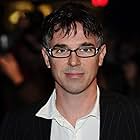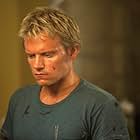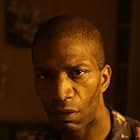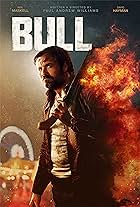A street-toughened parolee finds his two boys abandoned by their mum and fending for themselves. Time to step up, or not.A street-toughened parolee finds his two boys abandoned by their mum and fending for themselves. Time to step up, or not.A street-toughened parolee finds his two boys abandoned by their mum and fending for themselves. Time to step up, or not.
- Nominated for 1 BAFTA Award
- 3 wins & 8 nominations total
- Jonas
- (as Rad Kaim)
- Director
- Writers
- All cast & crew
- Production, box office & more at IMDbPro
Storyline
Did you know
- TriviaDirectorial debut of Dexter Fletcher.
- Quotes
Wild Bill: [discovering his youngest son's been helping sell crack] First year's the hardest.
Jimmy: What?
Wild Bill: Yeah that's what they say. "First year's the hardest." It weren't for me. Second year, that was the real killer. First year you can still remember the world - your home, your pals, Sunday roast, what it's like to take a dump without someone watching you. Second year, that's when the hope starts to leave ya. No one left to trust. No one you really like 'cause you're in prison. Everyone's a criminal. They all want to fuck you over. You don't want to go to sleep 'cause, whatever you got, it'll be nicked by the bloke you share your cell with... whose farts and stink you have to put up with twenty-four hours a day, seven days a week. Don't want to make friends with no one because, if you do, you make an enemy somewhere else. Nancies who want to rump ya. And, oh, yeah, blokes who don't think nothin' about creeping up behind you with a shank and sticking it in your throat. Do you know what the worst thing is? Do ya? You get used to it. So, Jimbo, what are you gonna do?
- ConnectionsFeatured in Projector: Wild Bill (2013)
- SoundtracksThe Guns of Brixton
Performed by The Clash
Written by Paul Simonon
Published by Universal Music Publishing Ltd
Courtesy of Sony Music Entertainment UK Ltd
Charlie Creed-Miles plays the eponymous 'wild' Bill, actually the name research tells me of a real-life American cowboy from the old West, who has served eight years in an Isle of Wight prison and has returned to the only other place in the world he knows: East London. What he returns to is nothing short of a mess: his two children, now 11 and 15, are living by themselves having had their mother walk out on them with a new man. Jimmy, his youngest, is failing school on account of not even attending, while Dean has already had to drop out to support the pair of them and now works on a construction site helping to build the 2012 Olympic Stadium. Try as I might, I could not spot any particular social commentary on the presence of such a thing.
Dean has little sympathy for his father, ordering him out and gone. Bill just wants to help. When he learns it was Dean's birthday shortly after getting out, he tries to host a party explaining that he felt bad for missing it. "Which one?" comes back the reply. What other characters say of Bill does not synchronise with what we come to observe of the man - he has lost something whilst being away, and is jokingly referred to as "mild" Bill by an accomplice. We know he made a mistake in the past - the barman at his local provides us with some information on what Bill used to do, namely drink a lot of beer and get into a mass brawl. It is worth noting, then, that when he sits and drinks with his friends Dickie (Neil Maskell) and Terry (Leo Gregory), he has resorted in this new epoch to drinking Coke as they down the amber nectar. Being on probation, and dead-set on not having to return to prison, Bill has to watch himself. To some extent, the film infers that prison works as a form of rehabilitation in Britain.
Having spun a highly effective opening act, Fletcher begins to poke and prod away at Bill's world when he decides to take up the challenge of the story: to remain in London rather than go to Scotland to work on an oil rig so as to get his children back on the right path. We're aware that Bill possesses tremendous potential to unleash Hell, but like Clint Eastwood's character in "Unforgiven", he seems to have moved on; he has either reformed or become too old or just wants to calmly go about his business now. Trouble introduces itself when Bill's newfound presence in the area seems to start hurting a drug business the aforementioned Terry has going with a mob-boss played by Andy Serkis. It manifests further when Terry begins using young Jimmy to transport drugs anonymously around the streets.
Like westerns of old, the film is unafraid of dealing in straight up heroes and villains. Despite the liberal age in which the film was made, and the liberal society in which it is set, the bad people use drugs and sell drugs, while the good people take care of their children, value family and strive for justice. Fletcher injects a real sense of completion, for example, when Bill; Dean; Jimmy and a female character with whom Bill has struck up a friendship - the mother the family unit had lacked up to that point - sit around a large table and consume a Chinese takeaway. The scene carries a particular sense of distinguishability. The enemies of this scene are as such because they wish to destroy it: whisking Bill to the opposite end of the country (or, better yet, back to prison); enslaving the boy to criminality and abusing the female.
To this extent, I am surprised there are so many positive reviews for the film - the earlier point about the film daring to depict a working-class man redeeming himself in the face of the woman neglecting her paternal duties worth reiterating; its depiction of a father coming home to sort out a mess and take care of his children worth reiterating. Fletcher balances each of the strands covering the characters wonderfully - Jimmy's falling in with the wrong crowd; Dean's relationship with a girl his age and, of course, Bill's redemption.
Fletcher peppers his films with various generic Western genre traits: when Bill first gets home to London, a tumbleweed-like item blows past to the strains of a Morricone-style choral moan, and we realise the hero is essentially here to clean up the town. Later on, prior to the metaphorical shootout finale, Bill looks out over the city to strains of a harmonica - Serkis' character's distinctive jet-black overcoats may even remind you of the coats Jack Palance's character wore in "Shane", while a name like 'Jimmy' may even be something you might find on an old American range way-back-when. Irrespective, "Wild Bill" is a bounding success for a debut film - very funny, very affecting and very well concocted.
- johnnyboyz
- Mar 8, 2019
- Permalink
- How long is Wild Bill?Powered by Alexa
Details
Box office
- Gross worldwide
- $194,099
- Runtime1 hour 38 minutes
- Color
- Sound mix
- Aspect ratio
- 2.35 : 1
Contribute to this page





































